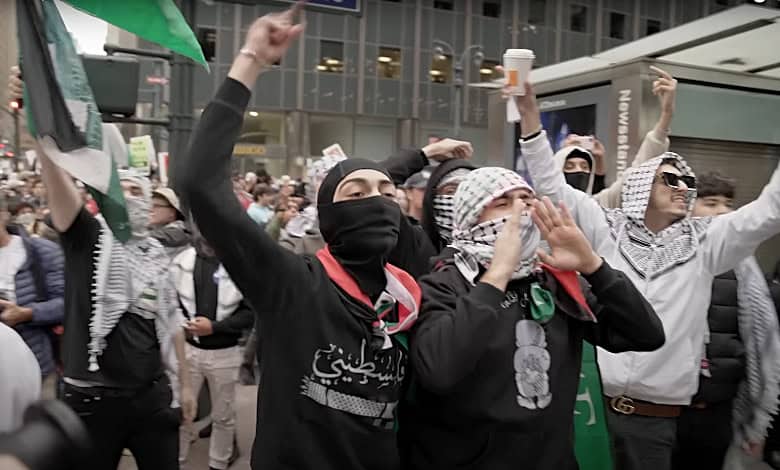‘October 8’ Director Reveals Threats Against Film Exposing Antisemitism
Wendy Sachs explains Hollywood's silence on campus hate, pro Hamas protests

Wendy Sachs caught a perfect storm on camera with “October 8.”
The documentary shows the shocking spike in antisemitism in the wake of the October 7 terrorist attacks that killed more than 1,200 Israelis and captured hundreds more.
- Pro-Hamas protests
- Virulent social media posts
- Mainstream media bias on steroids
The apolitical film, available on VOD platforms, doesn’t litigate the Israel/Palestinian conflict, the current state of Gaza or even the enduring hostage crisis.
That’s by design, Sachs tells Hollywood in Toto. Her goal was to chronicle antisemitism through an American lens, and the film does so with heartbreaking results.
“The theme of the film is, how did we get to this moment where Hamas is being celebrated as freedom fighters and not condemned as terrorists,” the author and filmmaker says. “It’s Islamic Jihadism vs. democracy in the West. That’s what’s at stake.”
“October 8” had a limited theatrical release starting March 14, never reaching more than 127 theaters nationwide. It still generated an impressive $1.3 million, a sum most documentaries never earn.
Select critics have called the film “propaganda,” decrying the lack of voices from the pro-Palestinian movement. She notes that “No Other Land,” a film told from the Palestinian perspective, didn’t interview Israelis on the decades-old debate.
That film won the Best Documentary Oscar earlier this year.
RELATED: ARE CRITICS AVOIDING ‘SCREAMS BEFORE SILENCE?’
Sachs has been taking “October 8” around the globe, showing it to governmental leaders and organizational heads in countries like Australia, Canada and Mexico. That effort will continue through the coming months.
When she first approached the subject, she assumed it would be a “layup” to snag funding and distribution. The subject matter couldn’t be more urgent, and she brought sizable skills to the title.
Sach previously directed “Surge,” a 2020 Showtime documentary chronicling three progressive politicians running in the wake of President Donald Trump’s 2016 victory. She also worked at CNN, FOX and MSNBC, bolstering her resume.
Her “layup” hit the rim and bounced out of bounds.
The protests on college campuses around the country were pro-terror. They weren’t pro-peace.
October 8 is playing in theaters nationwide. pic.twitter.com/pc7jj0VCGC
— October 8 (@october8thefilm) March 31, 2025
Documentaries are struggling to reach the masses in recent years. That wasn’t the only hurdle facing “October 8.” The subject matter proved “radioactive” within Hollywood, she says.
Her former employers balked at the project. So did major agencies in Tinsel Town like United Talent Agency (UTA) and William Morris, according to Sachs.
“People were supportive, saying, ‘This is really important, and it’s great you’re doing this, but we can’t sell it. There’s no market for this. The streamers aren’t going to touch this,’” she recalls. “That was generally the climate.”
Sachs understands, but only to a degree.
“It’s a very sensitive subject … they’re afraid of losing subscribers, of being protested,” she says, heaping praise on Briarcliff Entertainment for eventually picking up the film. The same indie studio gave us last year’s controversial film, “The Apprentice.”
Some of those fears were justified. She says protests routinely greeted her film, a subject the Mainstream Media mostly ignored.
“You don’t see those protests happening on the Palestinian films,” she says. “You don’t see the Jewish community protesting ’No Other Land.’ No death threats, no counter-terrorism alerts.”
RELATED: ‘OCTOBER 7’ PLAY FACES NEW THREATS ON ATTACK’S ANNIVERSARY
She says the New York Police Department’s counter-terrorism unit detected online chatter about “October 8” protests when the film played in the Big Apple. She attended the screening in question with a security detail to ensure her safety.
Some theaters used metal detectors to protect patrons, she adds.
“I can’t imagine that ‘No Other Land’ has a line item in their budget for metal detectors,” she says. “And it’s not talked about … it’s the elephant in the room to talk about that. You’re considered a racist or an Islamophobe.”
She attended a Montreal screening of the film and security officials suggested she enter the building via the basement, just to be safe.
All this over an apolitical movie highlighting rampant bigotry.
Even discussing the project inspired Cancel Culture-style attacks. Sachs recalls appearing on a Canadian talk show in the spirit of NBC’s “Today.” Protesters demanded the journalist who interviewed her be fired for giving her a platform.
She says Pro-Israel activists and interfaith leaders stepped in, defending the interviewer in question.
“That’s happened repeatedly,” Sachs notes.
Jewish artists are routinely protested and censored. Most recently, actor/comedian Michael Rapaport shared how his Alabama comedy appearance got canceled due to protests.
Jewish students on college campuses are being targeted and harassed for their identity alone.
October 8 is playing in theaters and at home on demand. Watch Now: https://t.co/P06llYEwks@Tessa_Veksler pic.twitter.com/dUv5lba6b2
— October 8 (@october8thefilm) April 10, 2025
All of this partially explains why the creative community – with exceptions like John Ondrasik, Debra Messing, Patricia Heaton and Rapaport – have been mostly silent on these issues. Messing helped produce “October 8” and both she and Rapaport appear in the film.
“I’m not saying people in Hollywood are antisemitic. They don’t want to deal with the noise on the other side… the headaches, the harassment,” Sachs says.
The filmmaker refuses to give up on the subject at hand. Her next project is “Poison Ivy,” an exposé of college antisemitism and the role foreign funding plays in it. She promises to show the receipts.
“It’s not just limited to universities,” she notes. “Public schools have created this whole oppressor-oppressed binary, colonizers and colonizing [model] … it’s hijacking a young generation.”
“October 8” is available now on VOD platforms like Amazon, Apple TV and Fandango at Home.
